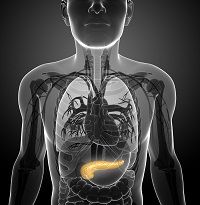Pancreas Transplant for Cystic Fibrosis Patients with Exocrine Insufficiency
Cystic fibrosis patients who lose pancreatic function are failing to avail themselves of operations that could replace their damaged organs and restore their ability to digest food and manage blood sugar.

An analysis of organ transplant records between 1987 and 2014 suggests that cystic fibrosis patients who lose pancreatic function are failing to avail themselves of operations that could replace their damaged organs and restore their ability to digest food and manage blood sugar.
Data from the United Network for Organ Sharing on 4,600 cystic fibrosis patients indicate that just 3 patients underwent pancreas-only transplants during that entire 27-year stretch. Another 17 cystic fibrosis patients received liver-and-pancreas transplants while 3 received lung-and-pancreas transplants, 4 received kidney-and-pancreas transplants and 1 received a liver-lung-and-pancreas transplant.
The explanation for the relative paucity of pancreas-transplant patients does not seem to be poor outcomes. The 2-year survival rate was 100% for pancreas-only transplants and 88% for liver-and-pancreas transplants.
Patients who underwent pancreas transplants also faced a lower risk of developing post-transplant diabetes than patients who underwent more common procedures. Only 7% of pancreas transplant recipients developed the condition, which struck 24% of liver recipients and 29% of lung recipients.
Another unlikely explanation for the relative paucity of pancreas transplants, at least in this particular study population, is a lack of awareness among doctors or patients about the possibility of transplants. The entire cohort consisted of cystic fibrosis patients who underwent at least 1 organ transplant because of their condition. Lung transplants were easily the most common procedure during the study period (4,241 patients underwent them) followed by liver transplants (303 patients).
“Despite a high prevalence of pancreatic endocrine and exocrine insufficiency in cystic fibrosis, pancreas transplantation is rarely reported,” the study authors wrote in the American Journal of Transplantation. “Further consideration of pancreas transplant in cystic fibrosis patients undergoing other solid-organ transplant may be warranted.”
Other studies of organ transplants in cystic fibrosis patients suggest that longer patient survival has increased the number of patients who suffer organ failure and need a transplant. Transplants have long been the preferred treatment for lung and liver failure, but they have yet to become a common for pancreatic insufficiency despite research that has generally found favorable outcomes, even in complex transplants involving multiple organs.
The first report of a simultaneous liver-and-pancreas transplant in patients with cystic fibrosis, which appeared a decade ago in Transplantation Proceedings, announced full liver and pancreatic function in 2 female patients and urged further research. “Simultaneous liver and pancreas transplantation in cystic fibrosis patients provides the advantages of normalization of glucose and improved nutrition for patients requiring liver transplantation and should be considered in cystic fibrosis patients with cystic fibrosis-related diabetes who require liver transplants,” the paper’s authors wrote.
The first report of simultaneous lung-and-pancreas transplants for cystic fibrosis patients appeared 3 years later in the Journal of Cystic Fibrosis, and its authors announced similarly good news. “All 3 cystic fibrosis patients presented for evaluation for lung transplantation and had pancreatic insufficiency requiring enzyme supplementation and cystic fibrosis-related diabetes requiring insulin. All were severely malnourished and required nutritional supplementation,” its authors wrote. “The pancreas allografts all functioned normally with normoglycemia independent of insulin. As a result of the enteric drainage of the pancreas allograft, supplemental pancreatic enzymes were no longer required… Simultaneous lung and pancreas transplantation in patients with CF can be performed successfully and provides the advantages of normoglycemia and improves nutrition for patients requiring lung transplantation.”